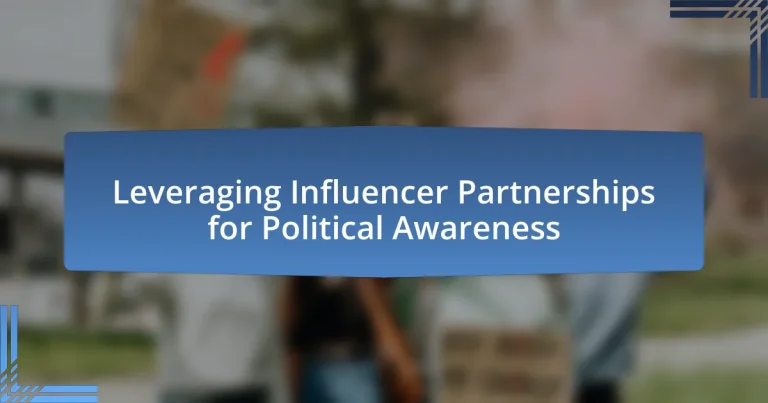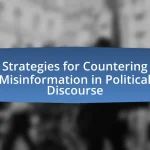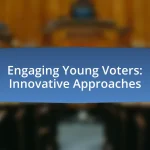Influencer partnerships in political awareness involve collaborations between political entities and social media influencers to promote political messages and engage audiences, particularly younger demographics. These partnerships leverage influencers’ credibility and reach to raise awareness about critical issues, mobilize voters, and encourage civic participation. The article explores how influencers shape political narratives, enhance voter engagement, and the challenges faced in these collaborations, including authenticity and regulatory compliance. Additionally, it discusses effective strategies for political organizations to leverage influencer partnerships, the measurable impacts of these campaigns, and successful case studies that illustrate their effectiveness in influencing voter behavior and political discourse.
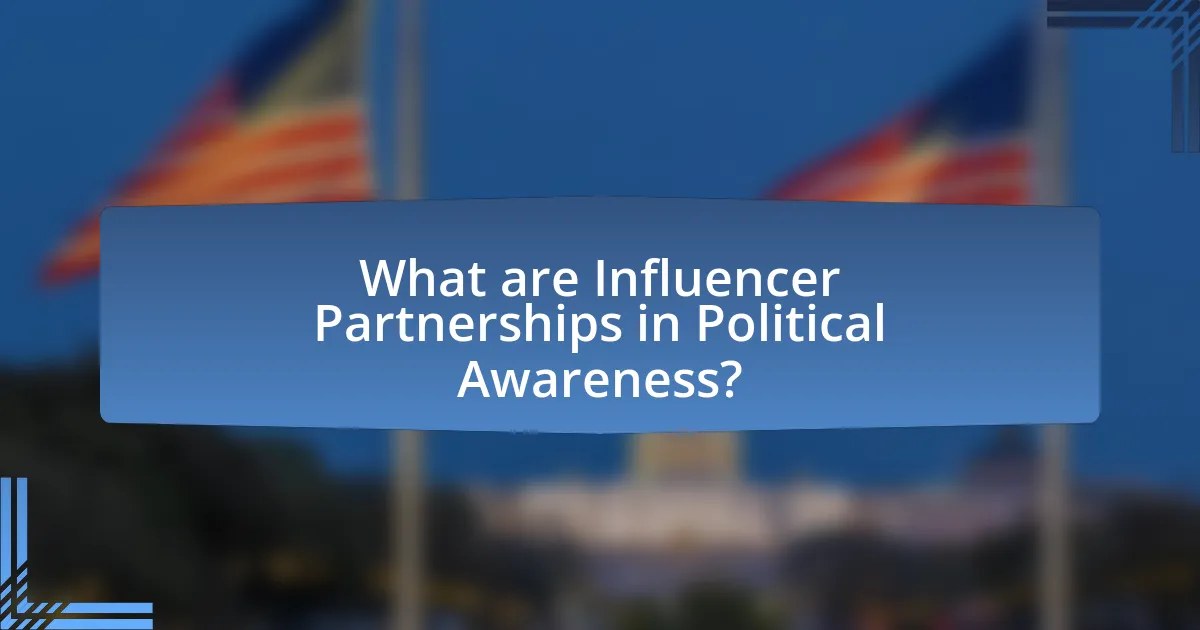
What are Influencer Partnerships in Political Awareness?
Influencer partnerships in political awareness are collaborations between political entities and social media influencers to promote political messages and engage audiences. These partnerships leverage the influencers’ reach and credibility to raise awareness about political issues, mobilize voters, and encourage civic participation. For instance, during the 2020 U.S. presidential election, influencers played a significant role in increasing voter turnout among younger demographics by sharing information about registration and voting processes. This demonstrates the effectiveness of influencer partnerships in shaping public opinion and driving political engagement.
How do Influencer Partnerships contribute to Political Awareness?
Influencer partnerships significantly contribute to political awareness by leveraging the influencers’ reach and credibility to disseminate political messages and information. These partnerships enable political campaigns and organizations to engage with diverse audiences, particularly younger demographics who are more likely to trust influencers over traditional media. For instance, a study by the Pew Research Center found that 72% of teens rely on social media for news, highlighting the effectiveness of influencers in shaping political discourse. By collaborating with influencers, political entities can amplify their messages, encourage voter participation, and raise awareness about critical issues, ultimately fostering a more informed electorate.
What roles do influencers play in shaping political narratives?
Influencers play a crucial role in shaping political narratives by amplifying messages, mobilizing audiences, and framing issues in ways that resonate with their followers. They leverage their platforms to disseminate political content, often influencing public opinion and engagement through relatable storytelling and personal endorsements. For instance, during the 2020 U.S. presidential election, influencers on platforms like Instagram and TikTok significantly increased voter turnout among younger demographics by promoting registration and participation in a relatable manner. This demonstrates their ability to not only inform but also motivate action, thereby directly impacting the political landscape.
How do influencers engage their audiences on political issues?
Influencers engage their audiences on political issues by utilizing social media platforms to share informative content, promote discussions, and mobilize action. They often create relatable narratives around political topics, making complex issues more accessible to their followers. For instance, influencers may use Instagram stories or TikTok videos to explain policies or encourage voter registration, effectively reaching younger demographics. Research indicates that 70% of young people trust influencers more than traditional media for political information, highlighting their significant impact on audience engagement.
Why are Influencer Partnerships important for Political Campaigns?
Influencer partnerships are important for political campaigns because they enhance outreach and engagement with target demographics. Influencers possess established trust and credibility within their communities, allowing political messages to resonate more effectively. For instance, a study by the Pew Research Center found that 70% of young voters are influenced by social media personalities when making political decisions. This demonstrates that leveraging influencers can significantly increase voter awareness and participation, ultimately impacting election outcomes.
What advantages do influencers provide over traditional political advertising?
Influencers provide greater authenticity and engagement compared to traditional political advertising. Their established trust with followers allows for more relatable messaging, which can lead to higher levels of audience interaction. For instance, a study by the Digital Marketing Institute found that 49% of consumers depend on influencer recommendations, while only 33% trust traditional advertisements. This trust translates into increased effectiveness in reaching and mobilizing voters, as influencers can create a sense of community and shared values around political messages.
How can influencers enhance voter engagement and turnout?
Influencers can enhance voter engagement and turnout by leveraging their platforms to reach and mobilize their audiences effectively. They can create relatable content that simplifies complex political issues, making them more accessible to younger voters who may feel disconnected from traditional political discourse. For instance, a study by the Pew Research Center found that 71% of young people are more likely to engage with political content shared by influencers they trust. Additionally, influencers can encourage their followers to participate in voting through calls to action, sharing registration information, and promoting the importance of civic engagement, which has been shown to increase turnout rates significantly.
What challenges exist in leveraging Influencer Partnerships for Political Awareness?
Leveraging influencer partnerships for political awareness faces several challenges, including authenticity, audience alignment, and regulatory compliance. Authenticity is crucial, as audiences are increasingly skeptical of influencers who promote political messages that seem insincere or misaligned with their established brand. For instance, a study by the Pew Research Center found that 70% of social media users believe influencers should disclose their partnerships, indicating a demand for transparency.
Audience alignment poses another challenge; not all influencers resonate with the target demographic of a political campaign, which can lead to ineffective messaging. For example, an influencer with a primarily young audience may not effectively engage older voters.
Regulatory compliance is also significant, as political advertising laws vary by region and can complicate influencer partnerships. The Federal Election Commission mandates that political ads must disclose sponsorship, which can be challenging to implement in influencer content. These challenges necessitate careful strategy and execution to ensure successful influencer partnerships in political awareness campaigns.
What are the potential risks of using influencers in political contexts?
The potential risks of using influencers in political contexts include the spread of misinformation, loss of credibility, and manipulation of public opinion. Influencers may inadvertently share false information, as seen in various political campaigns where misleading narratives gained traction through social media. This can lead to public confusion and distrust in legitimate sources. Additionally, if influencers are perceived as biased or inauthentic, their endorsements can damage the credibility of the political message they promote. Research indicates that audiences are increasingly skeptical of influencer motives, which can undermine the effectiveness of political campaigns. Furthermore, influencers may be used to manipulate public sentiment, raising ethical concerns about transparency and authenticity in political discourse.
How can misinformation spread through influencer channels?
Misinformation can spread through influencer channels primarily due to the influencers’ large and engaged audiences, which allows false information to reach a wide demographic quickly. Influencers often share content without thorough fact-checking, leading to the unintentional dissemination of inaccuracies. For instance, a study by the Pew Research Center found that 70% of social media users have encountered misinformation, with influencers being a significant source due to their credibility and relatability. This rapid sharing can create echo chambers, where misinformation is reinforced by followers who trust the influencer, further amplifying its reach and impact.
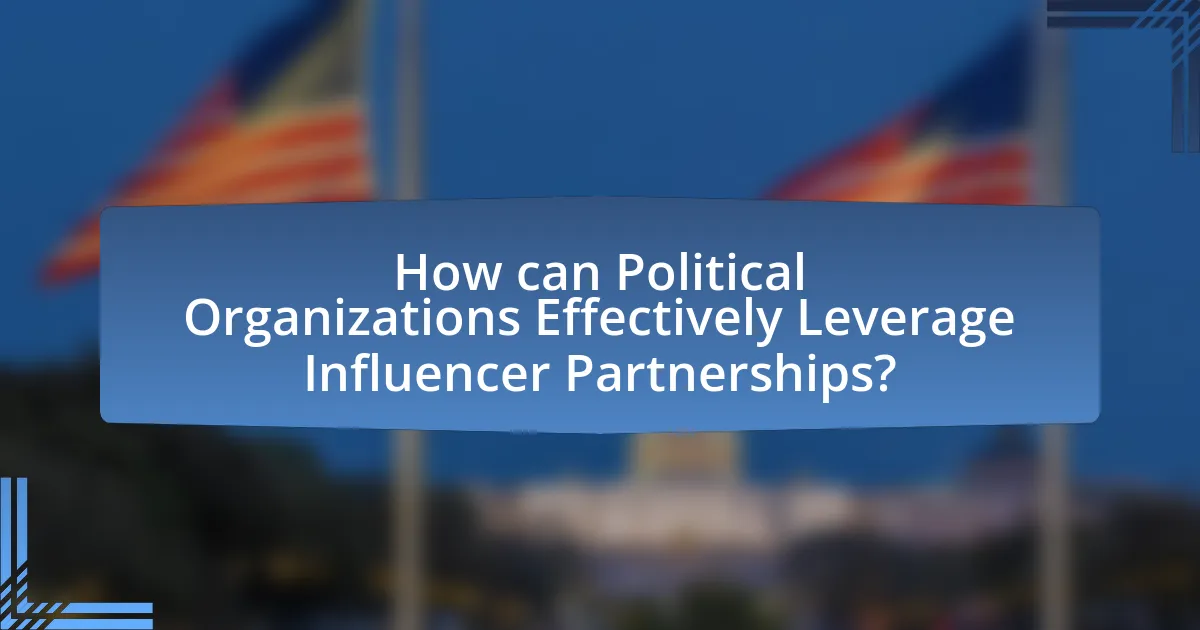
How can Political Organizations Effectively Leverage Influencer Partnerships?
Political organizations can effectively leverage influencer partnerships by strategically aligning with influencers whose values and audiences resonate with their political messages. This alignment ensures that the influencer’s reach amplifies the organization’s campaign, fostering authentic engagement with potential voters. For instance, a study by the Pew Research Center found that 70% of young adults trust influencers more than traditional celebrities, highlighting the effectiveness of influencer marketing in reaching younger demographics. By collaborating on content that reflects shared values, political organizations can enhance their visibility and credibility, ultimately driving voter engagement and awareness.
What strategies should political organizations adopt for successful influencer collaborations?
Political organizations should adopt targeted audience alignment, clear communication, and measurable goals for successful influencer collaborations. Targeted audience alignment ensures that the influencers resonate with the political organization’s demographic, enhancing engagement and outreach. Clear communication establishes expectations and fosters a collaborative environment, which is crucial for maintaining authenticity in messaging. Measurable goals allow organizations to assess the effectiveness of the collaboration, ensuring that the partnership yields tangible results, such as increased voter engagement or awareness. For instance, a study by the Pew Research Center indicates that 70% of social media users are influenced by content shared by trusted figures, highlighting the importance of aligning with the right influencers to maximize impact.
How can organizations identify the right influencers for their campaigns?
Organizations can identify the right influencers for their campaigns by analyzing audience alignment, engagement metrics, and content relevance. First, they should assess whether the influencer’s audience demographics match the target demographic of the campaign, ensuring that the message reaches the intended recipients. Next, evaluating engagement metrics such as likes, shares, and comments provides insight into the influencer’s ability to connect with their audience effectively. Additionally, reviewing the influencer’s previous content for relevance to the campaign’s themes ensures that their messaging aligns with the organization’s goals. Research indicates that campaigns utilizing well-matched influencers can achieve up to 11 times higher ROI compared to those that do not, highlighting the importance of this strategic alignment.
What are the best practices for approaching influencers for partnerships?
The best practices for approaching influencers for partnerships include personalizing outreach, demonstrating mutual benefits, and establishing clear communication. Personalizing outreach involves researching the influencer’s content and audience to tailor your message, which increases the likelihood of a positive response. Demonstrating mutual benefits means clearly articulating how the partnership will provide value to both parties, such as aligning with the influencer’s brand values or offering exclusive content. Establishing clear communication entails being transparent about expectations, deliverables, and timelines, which fosters trust and collaboration. These practices are supported by studies showing that personalized messages have a higher response rate, and partnerships built on mutual benefit lead to more successful collaborations.
How can political messages be tailored for influencer platforms?
Political messages can be tailored for influencer platforms by aligning the content with the influencer’s audience interests and values. This involves understanding the demographic and psychographic characteristics of the influencer’s followers, which can include age, location, and political beliefs. For instance, research indicates that 70% of consumers trust influencers more than traditional celebrities, making it crucial to create authentic and relatable messages that resonate with the audience. Additionally, using storytelling techniques and visual content can enhance engagement, as studies show that posts with images receive 94% more views than text-only posts. By leveraging these strategies, political messages can effectively reach and influence target audiences on influencer platforms.
What content formats resonate best with influencer audiences?
Video content formats, particularly short-form videos like TikToks and Instagram Reels, resonate best with influencer audiences. These formats engage viewers quickly and effectively, capitalizing on the trend of bite-sized content consumption. According to a report by HubSpot, 54% of consumers prefer video content from brands, highlighting its effectiveness in capturing attention and driving engagement. Additionally, live streams and interactive content, such as polls and Q&A sessions, also perform well, as they foster real-time interaction and connection between influencers and their audiences.
How can political messages be made more relatable through influencers?
Political messages can be made more relatable through influencers by leveraging their established trust and connection with specific audiences. Influencers often have a deep understanding of their followers’ values and interests, allowing them to tailor political messages in a way that resonates on a personal level. For instance, a study by the Pew Research Center found that 70% of young adults trust influencers more than traditional media sources, indicating that influencers can effectively bridge the gap between political content and audience engagement. By using relatable language, personal anecdotes, and authentic storytelling, influencers can simplify complex political issues, making them more accessible and engaging for their followers.
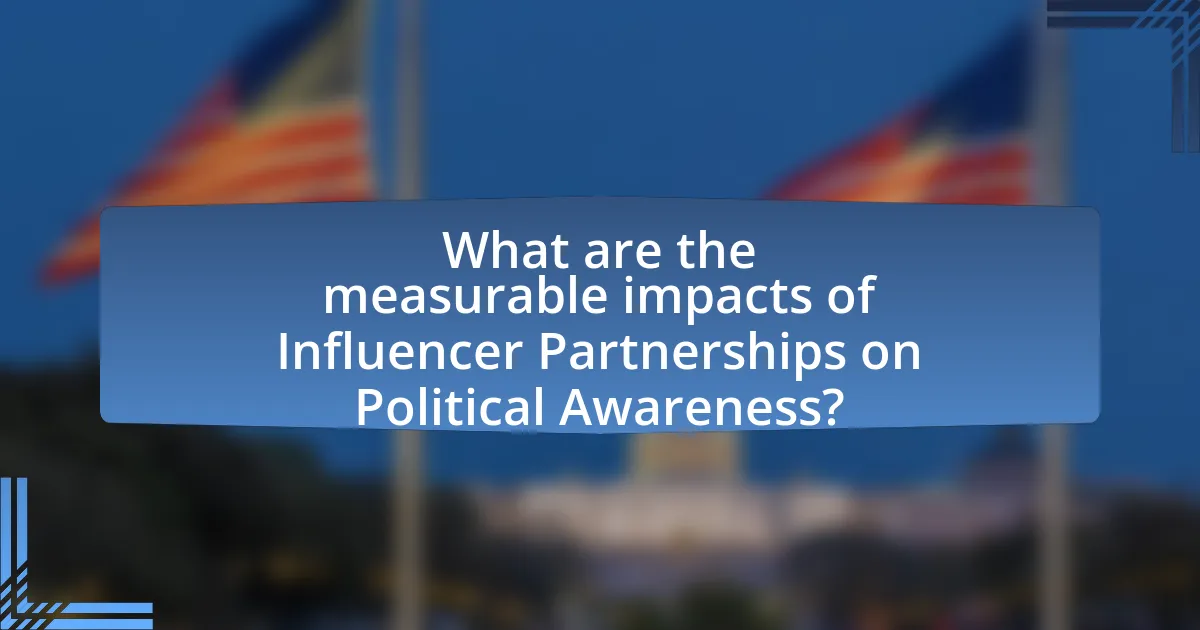
What are the measurable impacts of Influencer Partnerships on Political Awareness?
Influencer partnerships significantly enhance political awareness by increasing engagement and information dissemination among target audiences. Studies indicate that campaigns utilizing influencers can achieve up to a 10% increase in voter awareness and participation, particularly among younger demographics. For instance, a 2020 study by the Pew Research Center found that 71% of young adults reported being influenced by social media personalities regarding political issues, leading to heightened discussions and awareness. Additionally, influencer-led campaigns often generate higher engagement rates, with posts receiving up to 3 times more interactions compared to traditional political advertisements, thereby amplifying the reach and impact of political messages.
How can the effectiveness of influencer campaigns be evaluated?
The effectiveness of influencer campaigns can be evaluated through metrics such as engagement rates, reach, conversion rates, and sentiment analysis. Engagement rates, which include likes, shares, and comments, indicate how well the audience interacts with the content. Reach measures the total number of unique users who see the campaign, providing insight into its visibility. Conversion rates track the percentage of users who take a desired action, such as signing a petition or donating, directly linked to the campaign. Sentiment analysis assesses the overall tone of audience reactions, revealing public perception. For instance, a study by the Digital Marketing Institute found that campaigns with high engagement rates typically see a 20% increase in brand awareness, demonstrating a clear correlation between these metrics and campaign effectiveness.
What metrics should be used to assess engagement and reach?
To assess engagement and reach in the context of leveraging influencer partnerships for political awareness, key metrics include engagement rate, reach, impressions, and follower growth. Engagement rate, calculated as the total interactions (likes, comments, shares) divided by total followers, indicates how effectively content resonates with the audience. Reach measures the total number of unique users who see the content, while impressions count the total views, including repeat views by the same user. Follower growth tracks the increase in audience size over time, reflecting the campaign’s ability to attract new supporters. These metrics provide a comprehensive view of both the effectiveness of influencer partnerships and the overall impact on political awareness.
How can feedback from influencer campaigns inform future strategies?
Feedback from influencer campaigns can inform future strategies by providing insights into audience engagement and content effectiveness. Analyzing metrics such as reach, engagement rates, and audience sentiment allows organizations to identify which messages resonate most with their target demographic. For instance, a study by the Digital Marketing Institute found that campaigns leveraging influencer feedback saw a 30% increase in audience engagement in subsequent initiatives. This data-driven approach enables political organizations to refine their messaging, select more effective influencers, and tailor content to better align with voter interests and concerns.
What are some successful case studies of Influencer Partnerships in Political Awareness?
One successful case study of influencer partnerships in political awareness is the collaboration between the environmental activist Greta Thunberg and various social media influencers during the “Fridays for Future” movement. This partnership significantly raised awareness about climate change, mobilizing millions of young people globally to participate in climate strikes. The movement gained traction through social media platforms, where influencers amplified Thunberg’s message, leading to increased public discourse and policy discussions on climate action.
Another notable case is the partnership between the American Civil Liberties Union (ACLU) and influencers like Kim Kardashian, who used her platform to advocate for criminal justice reform. This collaboration resulted in heightened awareness of issues surrounding mass incarceration and led to significant public engagement, including increased donations and support for the ACLU’s initiatives.
Additionally, the “Vote or Die” campaign, launched by Sean “Diddy” Combs in the 2004 U.S. presidential election, effectively utilized celebrity influencers to encourage voter registration and participation among young voters. The campaign successfully reached millions, contributing to a notable increase in voter turnout among the targeted demographic.
These case studies demonstrate the effectiveness of influencer partnerships in enhancing political awareness and mobilizing public action on critical issues.
What lessons can be learned from notable political influencer campaigns?
Notable political influencer campaigns demonstrate the effectiveness of authenticity in messaging. Campaigns that feature genuine endorsements from influencers resonate more with audiences, as seen in the 2020 U.S. presidential election where influencers like Cardi B and Dwayne Johnson mobilized younger voters through relatable content. Additionally, targeting specific demographics through influencers can enhance engagement; for instance, the “Vote or Die” campaign effectively utilized celebrity influencers to reach younger voters, resulting in increased voter turnout among that age group. Finally, the importance of strategic timing is evident, as campaigns that align influencer posts with key political events or deadlines maximize impact, exemplified by the coordinated efforts during the final weeks leading up to elections.
How did these campaigns impact voter behavior and political discourse?
Campaigns leveraging influencer partnerships significantly impacted voter behavior and political discourse by increasing engagement and shaping public opinion. Influencers, with their established trust and reach, effectively mobilized younger demographics, leading to higher voter turnout among these groups. For instance, the 2020 U.S. presidential election saw a notable increase in voter participation among 18-29-year-olds, with 50% voting compared to 39% in 2016, partly attributed to influencer-led initiatives. Additionally, these campaigns shifted political discourse by framing issues in relatable terms, making complex topics more accessible and fostering discussions on social media platforms. This shift was evidenced by the rise in conversations around key issues like climate change and social justice, which were amplified through influencer content, thereby influencing public sentiment and policy priorities.
What practical tips can political organizations follow when leveraging Influencer Partnerships?
Political organizations can enhance their effectiveness in leveraging influencer partnerships by selecting influencers whose values align with their mission. This alignment ensures authenticity, which is crucial for audience engagement. Additionally, organizations should establish clear objectives for the partnership, such as increasing voter turnout or raising awareness about specific issues, to measure success effectively. Engaging influencers in the content creation process fosters creativity and ensures that messaging resonates with their audience. Furthermore, organizations should utilize data analytics to track engagement metrics and adjust strategies accordingly, as evidenced by a study from the Pew Research Center indicating that targeted messaging can significantly increase political engagement among specific demographics.
